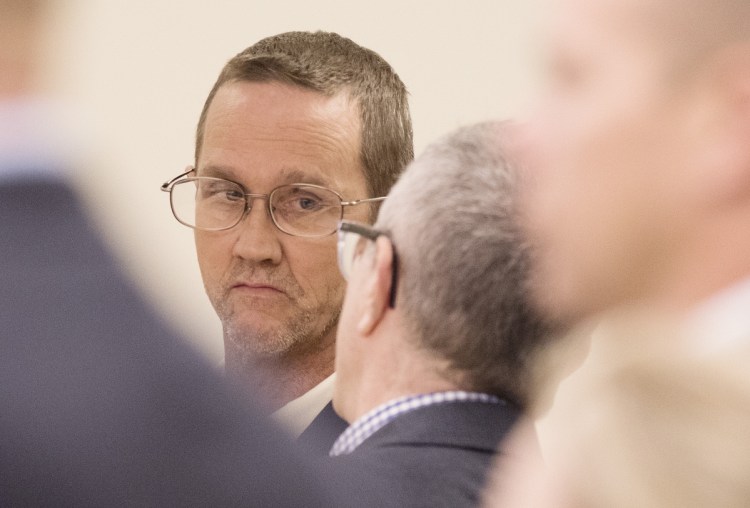An attorney for Philip Scott Fournier asked the state’s highest court Wednesday to overturn Fournier’s conviction for a murder that occurred 36 years ago.
Justices on the state’s highest court prodded the attorney to explain why the state erred during the bench trial early this year, but did not immediately issue a ruling in Fournier’s appeal.
Fournier, 57, was convicted in February of killing Joyce McLain in 1980 behind Schenck High School. He was arrested in 2016 after the state refocused attention and resources on the case.
Fournier’s appellate attorney, Rory McNamara, argued before five justices of the Supreme Judicial Court in Portland that at the original bench trial, which was heard by Superior Court Justice Ann Murray in lieu of a jury trial, the judge improperly disregarded alternative suspect evidence by considering it piecemeal, not in its totality; that the court erred when it did not allow a police officer testify about why Fournier was not arrested sooner; and that the court should have not allowed Fournier’s pastor to testify about a privileged conversation in which Fournier disclosed a key fact about the crime, and that he killed McLain.
McNamara is asking the court to either vacate Fournier’s conviction or order a new trial. Fournier was sentenced to serve 45 years in prison for the killing.
Assistant Attorney General Lara M. Nomani argued in court against the appeal, saying the court followed proper procedure during the trial, and that the judge considered all of the admissible evidence in accordance with the rules. Nomani argued in briefs that the court cosnidered testimony regarding the alternative suspect argument and that one alternative suspect in particular was not discussed at trial because it would be based on the speculative opinion of a police officer who had drawn parallels between the crime scene in the McLain case and another homicide.
In his arguments on behalf of Fournier, McNamara also asked the court to revisit a key question from the trial: Why did the police not arrest and charge Fournier earlier, even after he made incriminating statements to police?
Murray, the original trial judge, did not allow Fournier’s trial attorney to ask one of the police officers who was present for some of the key interviews with Fournier in 1981 why police did not act decades ago.
McNamara argued that the police officer could have testified about how Fournier acted in the interview that may have contributed to authorities not believing Fournier’s admissions and deciding not the charge him.
“Fact finders need to hear about the details,” McNamara said. “A change in tone. Averted eyes. A hand in front of the mouth. This informs a fact finder how much stock to place in a statement.”
McNamara pointed to case law in Maine in which police have been allowed to testify about their opinions of whether someone was credible, and that juries know the difference between the job of police and prosecutors when it comes to establishing facts.
Nomani countered that the officer was not in a position to answer those questions because he was not assigned to take notes or write a report on the interview and heard only portions of the statements, among other things. Nomani also suggested that an opinion about whether a suspect is telling the truth would not have been relevant.
“(Murray) disallowed an offer of an opinion because it was irrelevant, but she did allow this (police officer) to testify to his observations, in fact-based testimony,” Nomani said.
Nomani said, for example, that police officers cannot base their decisions about an drunk-driving case simply on an opinion as to whether the driver of a vehicle was intoxicated; they must articulate facts. Was the driver’s eyes blood shot? Was there an odor of intoxicants? Did they exhibit characteristics of intoxication?
Another point of contention was testimony by Fournier’s pastor that a short time after McLain’s death, Fournier admitted to killing McLain, and that Fournier then had his mother and step-father come to the meetings, where at the pastor’s urging, Fournier told his family he killed McLain.
In Maine rules of evidence, conversations between someone and their religious leader are privileged and a court or other body cannot compel the disclosure of the contents of those discussions unless the privilege is waived outright by the person, or the person discloses to a third part a significant portion of the privileged conversation.
The state argued successfully at trial that when Fournier told his parents he killed McLain, he surrendered his privilege.
But McNamara argued the disclosure by Fournier to his mother and step-father that he killed McLain occurred within the zone of privilege covered by the religious counseling the pastor was affording, and therefore did not constitute a breach.
Copy the Story LinkSend questions/comments to the editors.





Success. Please wait for the page to reload. If the page does not reload within 5 seconds, please refresh the page.
Enter your email and password to access comments.
Hi, to comment on stories you must . This profile is in addition to your subscription and website login.
Already have a commenting profile? .
Invalid username/password.
Please check your email to confirm and complete your registration.
Only subscribers are eligible to post comments. Please subscribe or login first for digital access. Here’s why.
Use the form below to reset your password. When you've submitted your account email, we will send an email with a reset code.